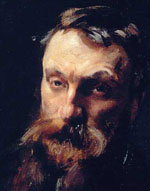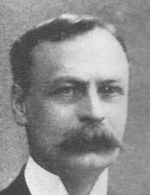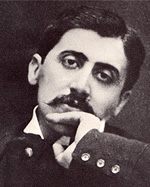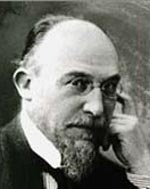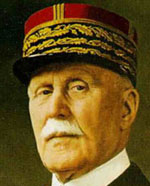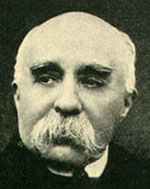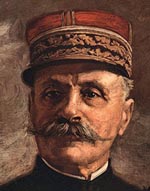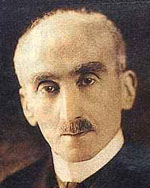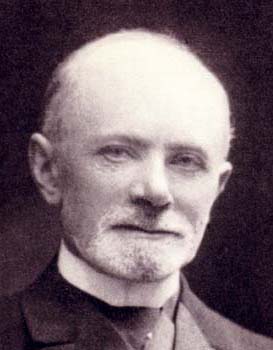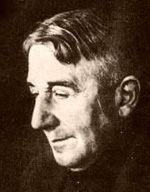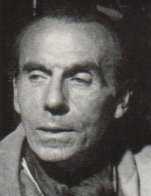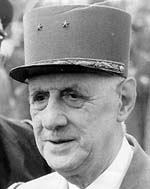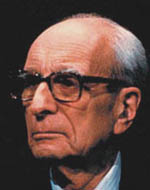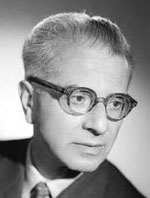Mots Français
Twentieth CenturyÉmile Zola (1840-1902)
The virtue of governmental corruption is the background it provides for citizen courage. The injustice and subsequent official cover-up in the Dreyfus Affair brought forth many criticisms, but it was this one word from the novelist Zola, in an open letter of 1898 to the President of the Republic, that focused the criticism and made it inevitable that justice would eventually be done. With that word, albeit slightly ahead of schedule, the twentieth century came into being:J'accuse
I accuse
Auguste Rodin (1840-1917)
Like the comparably gigantic figure Hugo, Rodin broke from the tradition in which he was taught, and became the dominant tradition of his own later years. He is the last painter-philosopher we shall include. In a late document, he has something to say to others who are attempting to take a new path. This line of it is precious to Sinologists as part of the epigraph Gu Jye-gang chose for his Gu Shr Byen series (1926-1941):Peut-etre ne serez vous pas compris tout d'abord, . . .
Others may not be able to understand you at first, . . .Seventy-five years later, the scientific study of the Chinese past which Gu and his circle represented seems still to be stuck in Rodin's subordinate clause. Efforts are currently underway to get on with the main verb, and indeed the main job.
Édouard Chavannes (1865-1918)
Chavannes, widely regarded as the foremost Sinologue of his time, is especially remembered for his Shr Ji translation project, and even more especially for the fact that it was never finished. Five volumes appeared between 1895 and 1905, and at that point he gave up what he described asCette interminable affaire
This interminable businessHis unpublished Shr Ji manuscripts, sometimes consulted by latter-day Sinologues, are preserved along with other Orientological treasures in the Musée Guimet in Paris.
Marcel Proust (1871-1922)
Reclusive, yet cosmopolitan within his chosen limits, Proust is the great short impressionist of the high early 20c society, to many of whose members (including Bergson) he was related. He is the ultimate insider of a very confined inside. His representative work in this vein is Les Plaisirs et les Jours (1896), a sybaritic take on Hesiod's "Works and Days." He is equally the great long impressionist of the same period. An early effort from 1909 was posthumously published as Contre Sainte-Beuve; it insisted on the divorce between man and artist, and did something to shape the anti-biographical critical theories of the later 20c. The final version of this project, fully realized as interior monologue, if not precisely as fiction, was A la Recherche du Temps Perdu (1913-1927), the only western work which readily challenges comparison with Murasaki. Proust is all atmosphere and continuity; he does not lend himself to witty extraction, and he does not figure greatly in the anthologies of established sayings. Perhaps this typically solipsistic remark may serve.Les liens entre un être et nous n'existent que dans notre pensée.
The bonds that unite another person to ourself exist only in our mind.Erik Satie (1866-1925)
Satie worked hard at his eccentricities, in both life and music. He was thus ready for celebrity when the mood of the nation turned his way. In his mockery of the conventional, he represents a surprisingly large segment of the early 20th century French mainstream, not only after WW1 but before it - a revolt against, or a vague discouragement with, standard good habits and customary expectations, a discouragement which the Dreyfus affair among other notable events had helped to prepare the ground. Such wryness invades even the conservative milieu in later French life. This line is from the tellingly absurd parody, A Musician's Day, published under the date of 15 February 1913:Mon lever: à 7h.18; inspiré: de 10h.23 à 11h.47
I arise: at 7:18; am inspired: from 10:23 to 11:47Henri Philippe Pétain (1856-1951)
Into all this art, nostalgic or satirical, there obtruded WW1, with Marshal Pétain heroically resisting invasion at Verdun. Such an event needed an emblematic saying, and one was duly attributed to Pétain.Robert Georges Nivelle (1856-1924)
It was, however, this subordinate of Pétain who, in an Order of the Day sometime in late June 1916, actually said:Ils ne passeront pas
They shall not passA successful saying never dies. This one saw service in France throughout WW1, and (in the translated form No pasarán, with attribution to Dolores Ibárruri), in the Spanish Civil War as well.
Georges Clemenceau (1841-1929)
Clemenceau had a difficult time coming to terms with the state:L'homme qui n'a pas été anarchiste à seize ans est un imbécile. Mais c'en est un autre, s'il l'est encore à quarante
A man who is not an anarchist at sixteen is an imbecile. But he is another, if he is still one at forty.He remained contentious toward the state as it was. Here, he shows the modern civilian's lack of trust in the efficiency of the armed forces:
La guerre! c'est une chose trop grave pour la confier è des militaires
War! That is something too important to be entrusted to the military menEver contentious, he was an early advocate of the cause of Dreyfus, and it was in his newspaper that Zola's 1898 letter was published (credit where it's due: it was probably Clemenceau who suggested the inflammatory and immortal title "J'accuse!"). That paper, originally l'Homme Libre, was suppressed in 1914 and reappeared as l'Homme Enchâiné (for the allusion, see Rousseau); in it, Clemenceau, whose own government had fallen in 1909, criticized the successor government for defeatism. He became once more the political leader of France during WW1, being simultaneously premier and Minister of War from 1917 onward.
As Minister of War, he was able to turn his contentiousness toward the enemy. In an 8 Mar 1918 speech, he affirmed his policies:
Politique intérieure, je fais la guerre; politique extérieure, je fais la guerre. Je fais toujours la guerre
Domestic policy: I wage war. Foreign policy: I wage war. I do nothing but wage war.The following line, which Clemenceau was wont to deliver at the opening of staff meetings, shows an understanding of both military and political management. It clarifies discussion by organizing it around a precise objective. Such focused thinking is one reason why, despite its surface contentions and conspicuous ennui, modern France "works." The saying has wide, if still unexplored, application to academic researches also.
De quoi s'agit-il?
What exactly is the problem here?As WW1 wound down, Clemenceau had a suitably wry reaction to President Wilson's "fourteen point" plan (1918) to rebuild Europe:
Quatorze? Le bon Dieu n'a que dix
Fourteen?? Even the Good Lord only had tenFerdinand Foch (1851-1929)
A younger colleague of both Pétain and Clemenceau, Foch gradually rose to high command. His military instinct, embodied in his theoretical writings, was for the offensive. In the battle of the Marne, early in WW1, his instinct stood him in good stead. His report to Joffre, from a situation where he was being overcome and could not withdraw, is famous:Pressé fortement sur ma droite, mon centre cède, impossible de me mouvoir, situation excellente, j'attaque
Am strongly pressed on my right, my center is giving way, it is impossible to move; situation excellent: I attack.His energy at that time saved Paris. From the slogging stalemate battles of Arras and Ypres that followed, he eventually learned to use a larger toolkit, and his leadership of the Allied side of the war is rightly credited with saving France. Then came the peace negotiations, and the treaty signed at Versailles on 28 June 1919. No French biographer of Foch mentions the remark attributed to him by English writers:
This is not peace; it is an armistice for twenty years.
And it may well belong to trans-Channel myth. In the post-Armistice political phase of the war, Foch fell out with Clemenceau, who had supported him in supreme command during the war. Foch and some of his military colleagues argued, almost to the point of insubordination, for a Rhine frontier. Clemenceau realized that this was politically out of the question. Each lived long enough to finish his memoirs before dying. The disagreement continued in that medium; and continues still.
Henri Bergson (1859-1941)
Several of the more prominent strands in French thought come from the study of other cultures. This comment, in Les Deux Sources de la Morale et de la Religion (1932), is contemporary with Granet's work on early Chinese folkways and religion:L'univers . . . est une machine à faire Des dieux
The universe is a machine for making gods
Alfred Loisy (1859-1941)
France was in the lead when the Enlightenment released much pent-up intellectual energy, but in Biblical studies, that ground untreadable in a Catholic country, the beginning was already faulty. Richard Simon's pioneering work of 1678 was suppressed, and had to be reprinted and read in the Netherlands and England). Came the 20th century, and there arose a movement called Catholic Modernism, seeking to reopen the question of the texts, and their miracles, such as the seven-day creation of the world, a doctrine untenable in the face of new discoveries about the age of the planet, and the long evolutionary process leading to man himself. Loisy, trained for the priesthood since the age of four, and ordained in 1879, was one of its leaders of the Modernist movement. In 1903, the new Pope, Pius X, revived the Index of Forbidden Books, and placed on it four of Loisy's recent publications. Many Modernist doctrines were officially declared heretical in the infamous encyclical Lamentabili sane exitu of 1907, followed later that year by the even more lamentable Pascendi dominici gregis. Loisy, who had given up his teaching position, continued to write. His commentary on the synoptic Gospels, in two huge volumes, was published at the beginning of 1908. Loisy was was excommunicated later that year. To the credit of secular France, a position in the History of Religions was created for him at the Collège de France in 1909, and there he taught until his retirement in 1931. During these years Loisy also continued his war with the church, when (as some think) there might have been better uses for his time. He did at any rate sum up in brief and memorable form his sense that the doctrines crucial to the church, and the church itself, were later developments, never envisioned by Jesus:Jésus annonçait le Royaume et c'est l'Église qui est venue
Jesus proclaimed the Kingdom, but it was the Church that camePaul Pelliot (1878-1945)
Still revered by many as the great example of Chinese philology, Pelliot's contribution did much to undermine philology in Chinese studies. He savaged the work of others in reviews (Hellmut Wilhelm described him as "the policeman of Sinology"), but never attempted any connected treatment of his own, save for a translation of the Secret History of the Mongols, which he never published. He spent his last years on learned trifles. Denis Sinor once hesitantly asked him why he did this. His answer, though charming, is also irresponsible, and sums up the image of worthless erudition on which the enemies of erudition seized in the postwar years, to discredit erudition itself:Ça m'amuse, Sinor; ça m'amuse
It amuses me, Sinor; it amuses meIt is hard to imagine that so learned and so French a man as Pelliot was unaware of the Hugo precedent. With the King of Sinology being so frivolous, it is hard to imagine that the Kingdom of Sinology had long to last. As, indeed, it did not. Chavannes' fatigue was survivable, but Pelliot's lack of fatigue, this sense that there was nothing left to be fatigued about, was fatal.
Alain (Émile Chartier, 1868-1951)
One of the first of the notable postwar writers here sounds a theme which was to become increasingly heard in later years. The point is the focus on the immediate:Aucun possible n'est beau; le réel seul est beau
Nothing merely possible is beautiful; reality alone is beautifulCéline (Louis-Ferdinand Destouches, 1894-1960)
The French literary mind did not rebound very buoyantly from WW1. Here, in a line from Voyage au Bout de la Nuit (1932), another spokesman for the postwar age takes precise aim at what makes civic life imaginable: the possibility of continuity.Celui qui parle de l'avenir est un coquin. C'es l'actuel qui compte
Whoever talks of the future is a charlatan. It's the here and now that countsAlbert Camus (1913-1960)
One need not follow recent French intellectualism all the way down the paths it marks out for itself, but at its core is a disillusionment with meaning which bulks large in modern perceptions generally. Here, in a line from Le Mythe de Sisyphe (1942), meaninglessness is not only embraced, it is imbued with a meaning of its own:L'absurde est la notion essentielle et la première vérité
The Absurd is the essential concept; the first truthCharles de Gaulle (1890-1970)
De Gaulle was whisked out of France in 1940 by being pulled at the last minute into a small plane by which a British envoy to the crumbling French government was departing for England. He is now immortalized in the name of the airport at which most foreign visitors arrive in France. He was the chief political figure in or out of France during WW2 and the postwar decades. He had always taken a large view of his country:Toute ma vie, je me suis fait une certaine idée de la France
I have all my life had a certain conception of FranceThe postwar decades were a glum time for France, and for that vision. The following remark was delivered following a political setback in 1951. It follows, and focuses into an unforgettable image, a line which clearly states the basic principle: Nations are most easily unified by an outside threat:
On ne peut pas rassembler à froid un pays qui compte 265 spécialités de fromages
One cannot in cold blood unite a country that has 265 different kinds of cheeseOne thinks of Confucius's observation (Analects 4:11) that the little man clings to his locality, and is oblivious to larger cultural and political issues.
Having retired in 1953, de Gaulle returned to office in 1958 as the only figure with sufficient stature to deal with the Algerian crisis. He negotiated Algerian independence in 1962, following revolts by French settlers. For de Gaulle, France and military glory were inseparable. This is from his Mémoires de Guerre:
La France ne peut être la France sans la grandeur
France cannot be France without greatnessDe Gaulle's arrogance, in asserting for France an international role which its strength no longer justified, concealed and helped to make palatable the not always glorious processs by which the nation found a new place for itself in Europe. There were also internal problems. Touring the Latin Quarter with his staff during the student demonstrations of May 1968, de Gaulle came to the spray-painted demand LA MORT AUX CONS (roughly, "Death to All Assholes"). After a moment's reflection, he made this wry comment:
Vaste projet
. . . and then passed on.
Claude Lévi-Strauss (1908-2009)
The Belgian-born Jewish anthropologist Lévi-Strauss spent formative time in Brazil (1935-1939), returned to France barely in time to have to escape it again, and found a wartime haven in New York, where he was much influenced by structural linguistics and by American anthropology. His vogue continues the prewar influence of Durkheim and Mauss, and takes it to further heights, or anyway, takes it further. He is esteemed for his literary skill, and his book titles have intentional and usually untranslatable resonances. One which obviously works better in its original language is his 1964 studyLe Cru et le Cuit
The Raw and the CookedÉmile Benveniste (1902-1976)
Born and raised in Syria, Benveniste came to France as a young man, intending to be a rabbi. Under the influence of Meillet (a pupil of Saussure), he became a linguist, eventually challenging Saussure's concept of the "sign" (the relation between a word and its meaning). The Dau/Dv Jing, coming straight out of the Upanishads, had long ago asserted the inadequacy of language to express the higher reality. Now arose the question whether language is adequate to express anything at all. The postwar assault on the concept of history, one dimension of this problem, was probably to be expected in a country which had been twice ignominiously rescued by outsiders from its own history. Here, from Problèmes de linguistique générale (1976), is Benveniste's opening solipsistic salvo in that confrontation:Le langage reproduit le monde, mais en le soumettant à son organisation propre
Language replicates the world, but by imposing its own structure on the worldJacques Derrida (1930-2004)
The ongoing tumult of postwar political and cultural life increased the previous disenchantment with standard certainties. Literature, which in its French academic sense can be taken as synonymous with "thought," retreated further into itself, but in a new language of cosmic, sometimes Einstinian, pretension (and, especially under the rubric of "deconstruction," with an agenda of political criticism). The world of concern is reduced to a text, and the text itself is held to be compromised as a vehicle of knowledge. The result, together with Derrida's focus on Dau/Dv Jing-like binary oppositions, has been undeniably influential. Derrida, who was born in Algeria and is thus (like Benveniste) a charter member of an "other" France, is perhaps especially alert to nuances of difference:La différence est l'articulation de l'espace et du temps
Difference is the articulation of space and timeWe believe this to be meaningless. But things like it do turn up in scholarly contexts, and one may as well be prepared.
25 Dec 2005 / Contact The Project / Exit to French Index Page

